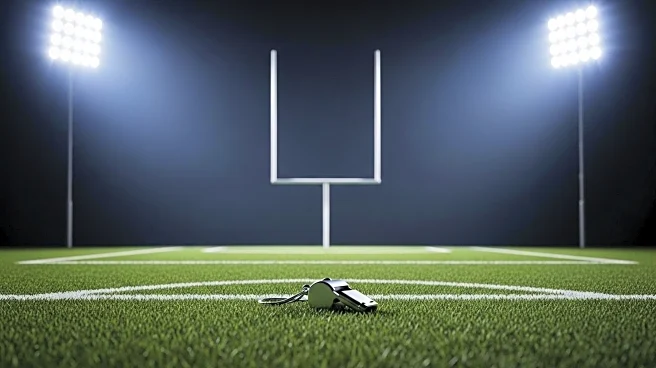What is the story about?
What's Happening?
Auburn's head coach Hugh Freeze expressed frustration after SEC officials missed a penalty during Auburn's 24-17 loss to Oklahoma. The controversy arose from a play where Oklahoma's Isaiah Sategna used a 'hideout tactic' to score a touchdown, which should have resulted in a 15-yard unsportsmanlike conduct penalty. The SEC acknowledged the officiating error, stating that the play violated NCAA rules against deceptive substitution tactics. Freeze attempted to call a timeout during the play but was unsuccessful. The incident highlights ongoing issues with officiating and rule enforcement in college football.
Why It's Important?
The missed penalty and subsequent acknowledgment by the SEC underscore the challenges of officiating in college football, where complex rules and fast-paced gameplay can lead to significant errors. Such incidents can affect the outcome of games and have broader implications for team standings and player morale. The controversy also raises questions about the effectiveness of current rules and the need for clearer guidelines to prevent similar issues in the future. For Auburn, the missed call contributed to their loss, impacting their season performance and potentially their ranking.
What's Next?
The SEC's acknowledgment of the error may lead to increased scrutiny of officiating practices and potential rule changes to prevent similar incidents. Coaches and teams may push for more consistent enforcement of rules and clearer communication with officials during games. The incident could also prompt discussions within the NCAA about improving training and oversight for officials to ensure fair play. Auburn and other teams affected by officiating errors may seek to address these issues through official channels or public advocacy.
Beyond the Headlines
The incident highlights the broader issue of fairness and accountability in sports officiating. It raises ethical questions about the responsibility of officials to ensure a level playing field and the impact of their decisions on teams and players. The controversy also reflects the high stakes of college sports, where a single call can influence the trajectory of a team's season and the careers of players and coaches. As college football continues to evolve, the need for transparent and consistent officiating will remain a critical concern for stakeholders.

















